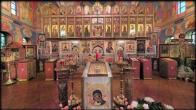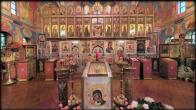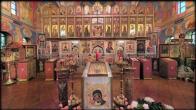ABOUT ORTHODOXY
You are here
The Parable of the Seed that Grows Secretly
So is the kingdom of God, as if a man should cast seed into the ground; and should sleep, and rise night and day, and the seed should spring and grow up, he knoweth not how. For the earth bringeth forth fruit of herself; first the blade, then the ear, after that the full corn in the ear. But when the fruit is brought forth, immediately he putteth in the sickle, because the harvest is come (Mark 4:26-29).
According to the opinion of Metropolitan Anthony Khrapovitsky, by the man who cast the seed into the earth, one needs to understand not God, as in the preceding two parables, but each man who plants good seed (i.e., the teaching of Christ and feats of piety) in his heart and in public life. Blessed Theophilactus, Archbishop of Bulgaria, considers that the man of the parable is God Himself, Who for the sake of our salvation became a man, like unto us in everything, except sin, from which He came to deliver us. Seemingly, both interpretations are fully acceptable and equally edifying.
He who sowed the seed, that is, the preacher of the Gospel, who casts seeds of faith into the souls of men, cannot follow how these seeds grow into whole ears, which with time will be gathered into the Kingdom of Heaven. In order words, he who is responsible for sowing the seed is not in a position to follow the further growth of the life of grace in himself and in others, as the husbandman is not in a position each minute to follow the gradual growth of the sown field. Every anxiety on the part of the tiller of the soil while the seed abides in the earth is superfluous. By this, the Lord wanted to assure the Apostles and the other preachers of the Good Tidings to be calm and not to be agitated over what becomes of the teaching of Christ preached by them. According to the word of Saint John Chrysostom: "The success of the preaching depended not on the Apostles, but on the grace that preceded them. Although it was their affair to go and preach, yet the persuasion God Himself carried out, working in the Apostles. So also the Apostle Luke said, that their heart the Lord opened (Acts 16:14).
As a plant coming forth from a seed passes through various stages of growth and development, so also a man, who has accepted the teaching of Christ and has been baptized, gradually is transfigured within and grows with the assistance of God's grace. At the beginning of his spiritual journey, a man is full of good impulses, which seem to be fruitful, but which in fact prove to be unripe, like the young shoots of plants. The Lord does not enslave man's will through His omnipotent power, but affords him the time to become enriched by this gracefilled power, in order to get stronger in virtue. "The seed grows as if without His (God's) knowledge," explains Blessed Theophilactus, "because we are free, and for this seed to grow or not to grow depends on our will. We do not bear fruit against our will, but willingly, that is, we bear fruit from ourselves. At first, when we are babes, not yet having attained to the measure of the stature of Christ, we sprout a bit of 'green', we show the beginning of good; later the 'ear', when we are already in a condition to withstand temptations as well, for the ear is already connected by stem, stands upright and has already attained a great degree of development; then the 'full corn' in the ear is formed this occurs when someone bears the fruit of perfection." In other words, only the spiritually mature man is capable of offering to God the perfect fruit of good works. When God sees a man who has become spiritually formed, then He takes him from this life unto Himself, which in the parable is called the "harvest".
The teaching of Christ, with God's help which is invisible to human eyes, with time gives fruit and brings benefit. That is, the grace of God acts on the soul gradually. "Divine grace, which in one instant can purify a man and make him perfect," writes Venerable Macarius the Egyptian, "begins to visit the soul gradually in order to test the human will." The Lord, invisibily confirming virtue in the heart of the man who believes in Him, like the sun and rain, which raise up the wheat growing in the field, unexpectedly for the laborers discloses the gracefilled fruits of their labors and gives an abundant divine harvest. For the contemporaries of Christ, the inner process of growth of a seed into a whole plant was inexplicable and imperceptible. Precisely in the same way, the religious transfiguration of a man's soul is imperceptible and inexplicable, performed by the power of God's grace. This is the main idea of the parable.
Jesus Christ, in His preaching and parables, precisely distinguishes the Kingdom of Heaven from the Kingdom of God. By the Kingdom of Heaven, He means the Kingdom of God which is intended for the righteous at the end of time; it begins after the final judgment over the human race. The Kingdom of God he calls the Church founded by Him on the earth, consisting of those who believe on Him and do the will of the Heavenly Father, Who sent Him. The Kingdom of God the Church, is divided into two parts. This Kingdom consists of the Church Militant, which is carrying out its mission in the world and in time and which is struggling with evil for the eternal salvation of its children, and the Church Triumphant, which abides in the heavens and consists of the righteous. The Kingdom of God (the Church Militant) prepares men who enter into it for the Kingdom of Heaven (the Church Triumphant); it began with the advent of Christ, Who cast into the hearts of men the word of God, just as the tiller of the soil casts seed into the earth. This Kingdom will end when the time of harvest comes, when the fruit fully ripens which grew from the word of God that was sown. And this fruit ripens when all mankind inhabiting the earth is united into one society of believers, into one flock of the One Pastor; when all mankind becomes one field, in which good seed is sown. Then, for the righteous will being the blessed life in the Kingdom of Heaven, in the Church Triumphant. The visible participation of Jesus Christ in this Kingdom is expressed in the founding by Him of this Kingdom and in the sending of the harvesters, i.e. the Heavenly Powers, the angels, when the fruit ripens.
Christ's invisible leadership of this Kingdom now is undoubted for all those who believe on Him, but 2000 years ago the throng of listeners that stood on the shore before Jesus did not have such faith in Him, and did not understand was that Kingdom of Heaven was. For this throng it was necessary to bring forth from its ordinary life am obvious example for elucidating how the Kingdom of God her on earth begins and how it ends. The sowing, which was spoken of in the parables of the Sower and of the wheat and tares, served as the best example. The man who had cast seed into the earth prepared by him for this did by this all that was required of him, although with desire he can oversee the growth of that which is sown, and protect it from unpleasant surrounding influences, but, as a consequence of the enlivening energy concealed in the seed, the earth bringeth forth fruit of herself; first the blade, then the ear, after that the full corn in the ear. Thus also, the word of God, sown by Jesus Christ and having fallen well pleasing ground, as a consequence of the grace filled power contained in it, gives birth to a man, and if neither thorns, nor tares choke it, then it will itself grow up and give fruit. According to the word of Venerable Macarius the Egyptian: "…It is incumbent on one who expects to receive from God the seed of grace to first of all cleanse the earth of the heart, in order that the seed of the Spirit that falls on it would bear perfect and abundant fruits".
To retain in ourselves the grace of God depends on us, on our efforts. On this, Saint John Chrysostom writes: "When is grace with us? When we do not offend this benefaction, do not despise this gift. Who then in offending this grace can preserve it and not be deprived of it? God has granted thee absolution of sins, how then can a good mood or action of the Spirit abide with thee, if thou dost not retain it by good deeds? The cause of all good things lies in the grace of the Spirit always abiding with us. It leads us to every good thing, and when it leaves us, we remain abandoned and we perish. Let us not leave it! It depends on us whether it remains with us or not. It remains when we take care for the heavenly; it leaves when we are immersed in the worldly."
Grace is not magic. Without our efforts, God does not start to grant us His grace. In order to understand this better, the Fathers of the Church said: "God created man without his (man's) participation, but He cannot save him without his participation." In other words, having created man, God gave him the freedom to choose between good and evil. The Lord does not restrict the freedom of man, although he want every man to choose salvation.
©V. Potapov
PARISH LIFE
RECENT VIDEOS
Address of our Cathedral
Subscribe to our mailing list
While all the materials on this site are copyrighted, you may use them freely as long as you treat them
with respect and provide attribution on the Russian Orthodox Cathedral of St.John the Baptist of Washington DC.









